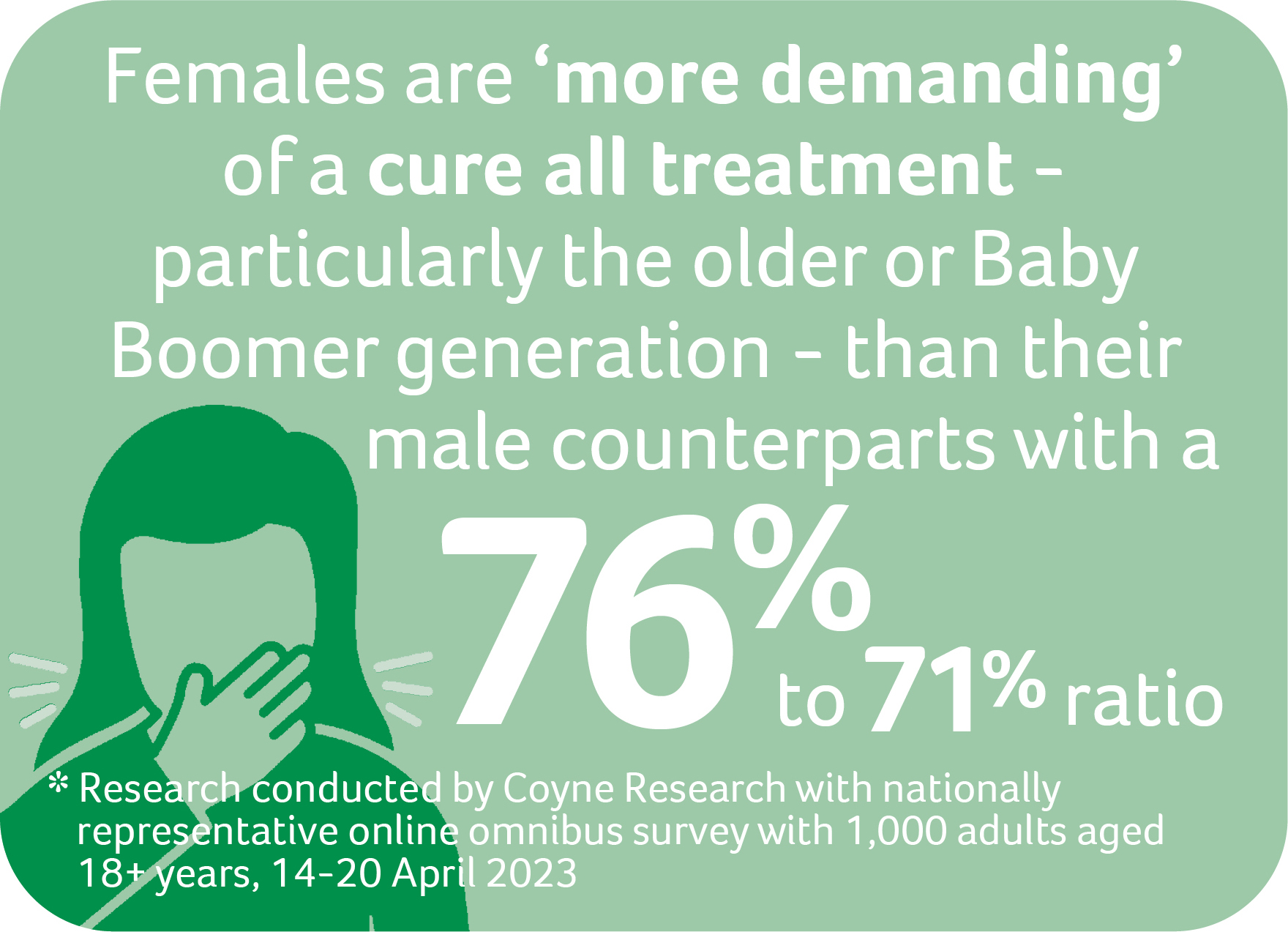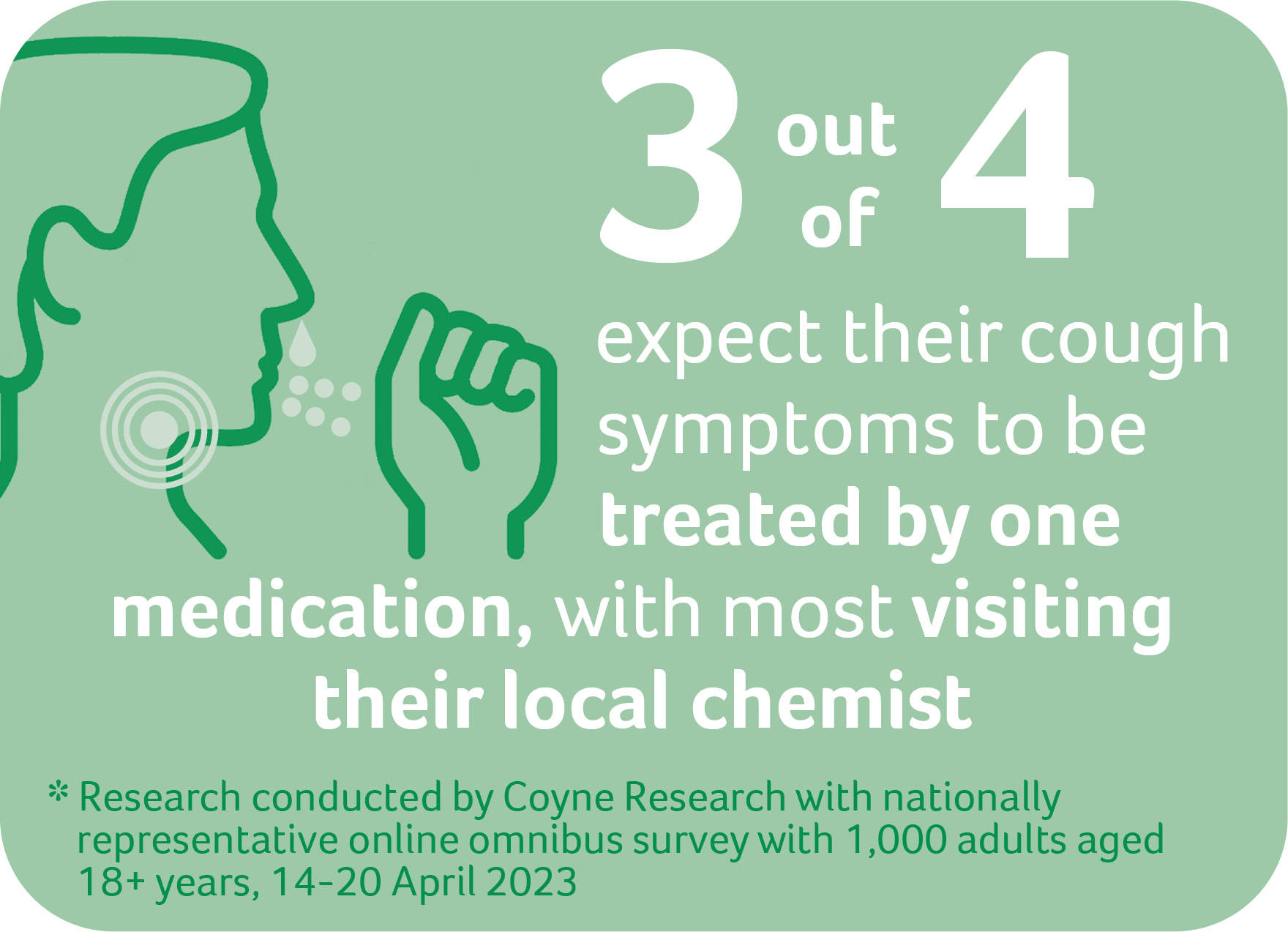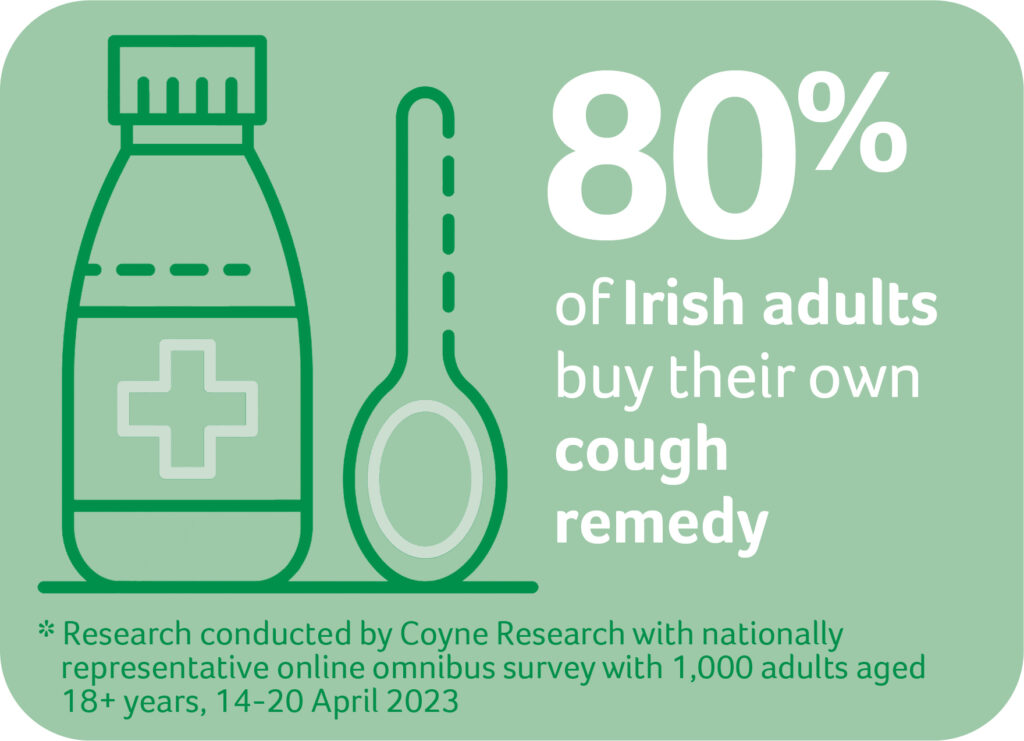Home » New research helps people to deal with symptoms of cough
It has long been seen as one of the most common ailments for patients presenting to pharmacists for over-the-counter treatment, but the simple cough can have many different causes and potential remedies. In this article, journalist Arlene Harris provides an overview of new research on how people deal with symptoms of cough.

While people of all ages and demographics are susceptible to the symptoms of cough, how they deal with it and what they expect from medication does differ between genders and generations. In a bid to discover how people of different ages, genders and life stage deal with symptoms of cough, Coyne Research* has carried out a national survey with 1000 adults over the age of 18.
Amongst the findings, results have shown that females are more likely than males to find the symptoms of coughs and colds to be disruptive on their lives and are also ‘more demanding’ of a cure all treatment — particular the older or Baby Boomer generation — than their male counterparts with a 76% to 71% ratio.
However, while results showed that females expect more from their cough treatment, they are also less likely to take time off work when they are under the weather — but one out of every two Generation Zs (those in their mid-twenties), admitted to seeking sick leave when they have a cough or cold.
The research appears to show that both females and the older generation have a higher threshold for knowing when they are sick and when they need medication — and women are far more descriptive than men when describing their symptoms to a health professional.
But along with getting the best possible treatment for their particular cough, it is also imperative for patients to practice good hygiene when they are sick, and the latest research has shown that an overwhelming majority (80%) of Irish adults are aware of the need to cough into their elbow to prevent the spread of germs, while 70% also cover their mouth with a tissue.

With the ‘cough season’ looming on the horizon, Tomás Conefrey of Conefrey’s Careplus Pharmacy on Pearse Street, Dublin, agrees with the findings, and says the autumn months are usually the busiest for coughs and colds, with most customers seeking treatment within two to three days of feeling the first tell-tale signs; “In my experience, when the kids go back to school in September, the cold and flu season starts in earnest. Airborne viruses are the most common cause of cough, although since the COVID-19 pandemic the general public are more conscious of better cough etiquette such as sneezing into their elbow, washing their hands after coughing and using alcohol gel on their hands.”
Mr Conefrey said; “But this can only do so much and people still do get sick — in fact, looking back to last winter, I remember a lot of parents with children from two years of age and upwards, were coming to us to look for help with their children’s coughs.”
The recent research discovered that between 89% and 92% (male to female ratio) are conscious of not spreading germs to others — this is compounded by the findings that one in three Irish adults will move away from someone who is coughing as they, particularly the older generation, find the sound irritating.
“The latest research has shown that an overwhelming majority (80%) of Irish adults are aware of the need to cough into their elbow to prevent the spread of germs, while 70% also cover their mouth with a tissue.”
It also revealed that 80% of Irish adults buy their own medication and three out of four of those expect their cough symptoms to be treated by one medication, with most heading straight for their local pharmacy.

“Pharmacy is the first port of call for a lot of people, especially since it can sometimes take a day or two for an appointment with a General Practitioner,” says Mr Conefrey. “The general public is really starting to come around about the accessibility of pharmacists and the expectation is that they want the cough to stop without having to go any further — so they are trying to prevent going to their doctor or, even worse, the Accident and Emergency Department.” Mr Conefrey continued; “But I think that most people are realistic about the duration of a cough, and I tend to advise that if after five to seven days the symptoms still haven’t resolved, they should go to their GP.”
Seeking help from a doctor is sage advice if cough symptoms are not helped by over-the-counter medicine, but the Dublin-based pharmacist always starts the treatment process by first selecting a remedy, which he believes will best help to alleviate symptoms: “The two most common types of cough are a dry cough and a chesty cough. Dry coughs are often called non-productive coughs as there is no mucus present and patients often describe them as being ‘tickly’ coughs. Chesty coughs are ones where mucus is present, and they seem to be deeper in the chest. For a chesty cough my product of choice would be an expectorant such as a guaifenesin-containing cough bottle and I would suggest a sugar-free option if possible.”
Mr Conefrey continued; “For a dry-cough my product of choice would be a cough suppressant called dextromethorphan — again a sugar-free version if available. But if someone who is asthmatic or has COPD, I wouldn’t recommend a cough suppressant for a chest infection as it can stop their chest clearing phlegm and may prolong the infection.”
For children under the age of 12, there are specific versions of the adult cough medicines, but these are only suitable for children aged six years and older in specific circumstances — however, Mr Conefrey says that he prefers to stick to a simple honey and lemon cough bottle, where possible: “I find these to be very good for children of one year and older, but they are not recommended for those who are younger, due to sensitisation risks in later life,” he explains. There are also a number of products on the market which contain thyme herb and marshmallow extract and these are available as both cough bottles and pastilles. They are traditional herbal remedies marketed as being suitable for both chesty and dry coughs and the products for children are very popular: “Based on what parents are telling me, they seem to work quite well. In fact, I have been really surprised with the demand for the pastilles — and they are also a lot easier than a bottle to carry around.”
So, it is clear that there is a lot of variety in both the types of cough, and the relevant treatments, and Mr Conefrey says that while it can be easy to differentiate between a chesty cough which produces phlegm, and a dry unproductive cough, there is a little more to consider when it comes to knowing when a doctor’s opinion is necessary: “If a cough lasts more than five to seven days or if there is shortness-of-breath or difficulty in breathing, I would definitely refer to a doctor,” he says. “Also, I would refer children who are less than one-year-old, and if a patient has severe asthma or COPD, or if they are frequently buying cough bottles and their condition isn’t improving. I always watch out for red flags which suggest the case is not simple and where referral to a doctor would be recommended. For example, I would always seek to identify high-risk patients such as those with a weakened immune system or older patient.”
“If there is abundant mucous, fever and sweats, unexplained weight loss or the patient is coughing up blood, then this requires further investigation. Similarly, if the patient is experiencing heartburn or localised chest pain, swollen glands or a cough which quickly gets worse and they can’t stop coughing, then I would refer the patient.”
Younger people, especially millennials, are less likely to visit a pharmacist than their older counterparts when they feel the signs of a cough coming on, and are also less inclined to use a face mask or hand sanitiser.
But according to community pharmacist, Tomas Conefrey, in general, the Coyne Research findings are very positive overall, and show that the majority of people are aware of the need to use correct cough etiquette to prevent the spread of germs.
“My advice for people who are concerned about passing their cough on to others would be to do their best to observe cough etiquette,” he says. “Make sure to cough and sneeze into your elbow as much as possible, wash hands properly and dispose of used tissues — and if at work, in company or at home wear a face-mask when around people.”
He continued; “I would also advise people to wash their hands properly after a bout of coughing and to apply alcohol hand gel to their hands and to carry it with them when on the move, as well as using alcohol wipes to disinfect surfaces at work and home.”

* Research conducted by Coyne Research with nationally representative online omnibus survey with 1,000 adults aged 18+ years, 14-20 April 2023
Arlene Harris

Highlighted Articles